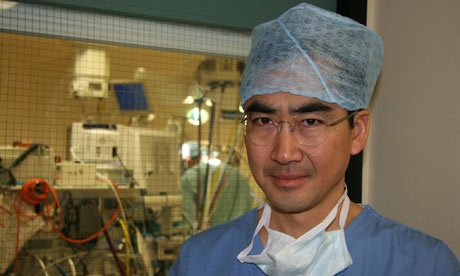
Blessing is just 48 hours old. A serious congenital heart defect means that, without surgery, she will die within days or weeks. But the operation could itself prove fatal. "Her father agreed to it without hesitation, which is a reflection of human love," recalls Victor Tsang, the cardiac surgeon who performed the procedure. "He wanted us to do everything we could to help his daughter, even at the risk of her death."
The baby's plight typifies those confronted regularly by staff at Great Ormond Street hospital in central London, the world's best-known children's hospital. Its expertise means it ends up accepting patients few others can. Tonight a candid BBC2 series begins which shows the trauma involved for those who have the unenviable task of deciding when to treat, or not to treat, children who have run out of options.
"I gave Blessing's father the options of a major operation that involved putting her on a heart and lung bypass machine, or comfort care – palliative care, no surgery, letting nature take its course," says Tsang. "It was very difficult for him to take in what I was saying. His newborn daughter was very sick in hospital, his wife was recovering from a caesarean section and so he also had to look after his two other children."
Parents always want to know the percentage risk involved in an operation, adds Tsang. "It's hard to apply a mathematical risk to an individual. If parents say, 'Doctor, if there is even a few per cent chance [of success], we are prepared to take it,' then it's very difficult for the doctors to say no."
But that natural human reaction puts doctors in a difficult position. "We want to push the boundaries medically speaking, because that's how progress has been made in surgical techniques," says Tsang. "And as human beings we understand the dilemmas and the trauma that the family is going through. I try to imagine their position, because I have children myself and I know how precious children are to their parents. But sometimes you know the chances of success are quite low because the child is so sick."
Tsang admits that, in his 16 years as a children's heart surgeon, parental pressure to proceed has meant that "there have been occasions on which I felt 'this is the wrong thing to do'. I remember operating once at 2am on a newborn baby with the same problem as Blessing. I was hesitant because deep down I knew the outcome would be negative. But the parents said that if there was even a 1% chance they would take it, because, as parents, there was a glimpse of hope. During the operation I knew that whatever I was doing was futile, and the feeling of loneliness was enormous. But as a professional I still had to finish." The baby died a few days later.
Sometimes parents have unrealistic expectations of what modern medicine can do to help or save their child, and that puts real pressure on frontline staff. The case of eight-month-old Aicha in the programme is a vivid illustration. The Great Ormond Street doctors have told her parents that there is nothing they can do. Their daughter has a narrowing of the veins between her lungs and her heart; she could stop breathing at any time. But her parents refuse to accept the doctors' word. Her mother says that medical technology has advanced so much that something must be possible. Their doctor then takes her case back to a meeting of the entire cardiac team. It is they, not individual doctors, who collectively decide when surgery is or is not worth the risk. Continuing to refuse Aicha surgery means her parents will sell everything they have to pay for her to undergo treatment in America, he tells his colleagues, admitting that he is too close to the family to make an objective assessment of what to do next. The team decides to seek a second opinion from three other leading children's hospitals worldwide.
"On a personal level, unless you get involved [with patients' families] to some extent then you don't function very well," says Professor Martin Elliott, a cardiothoracic surgeon involved in Aicha's treatment. "It can be completely exhausting, physically and emotionally. Part of surgery is being confident that you can cope, that you can do the job technically and emotionally. But you have to find a way of living with the anxiety of whether or not you have made the right decision."
Performing the highly complicated, life-or-death procedures is the easy bit, says Tsang. "It's the ethical issues that matter – the decisions. I wish I had the wisdom and the courage to say no [more often]. But quite often, deep down, the desire to help may become more of a powerful force."
• Great Ormond Street starts tonight on BBC2 at 9pm.

